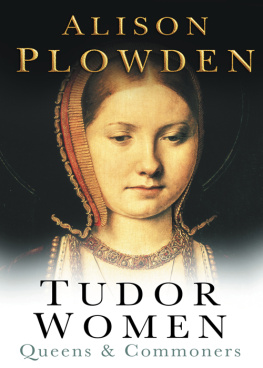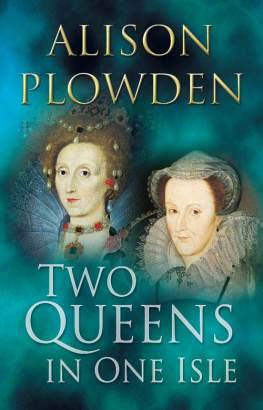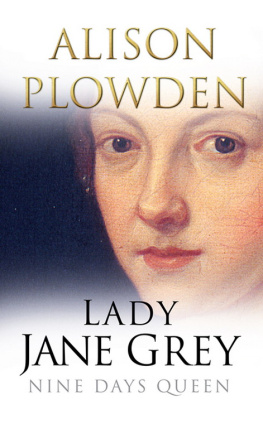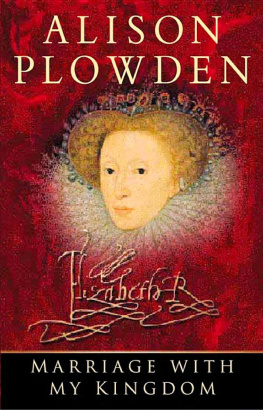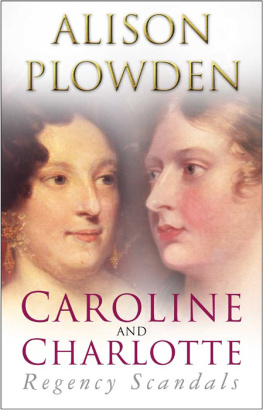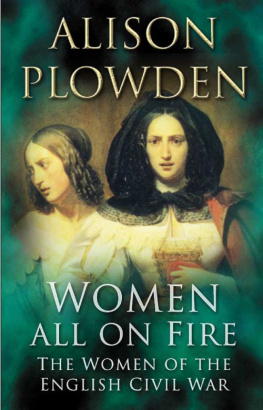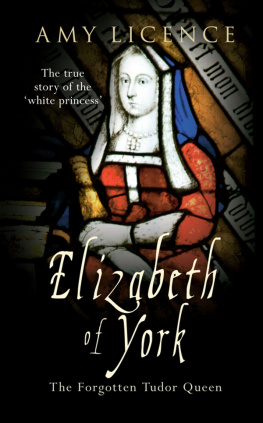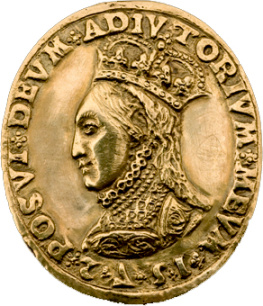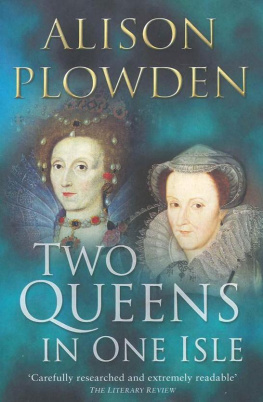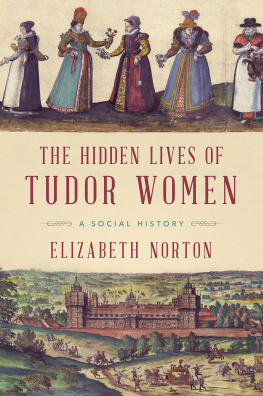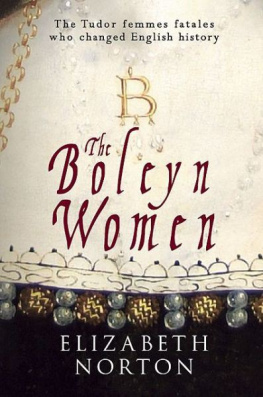Alison Plowden - Tudor Women: Queens & Commoners
Here you can read online Alison Plowden - Tudor Women: Queens & Commoners full text of the book (entire story) in english for free. Download pdf and epub, get meaning, cover and reviews about this ebook. year: 2002, publisher: The History Press, genre: Non-fiction. Description of the work, (preface) as well as reviews are available. Best literature library LitArk.com created for fans of good reading and offers a wide selection of genres:
Romance novel
Science fiction
Adventure
Detective
Science
History
Home and family
Prose
Art
Politics
Computer
Non-fiction
Religion
Business
Children
Humor
Choose a favorite category and find really read worthwhile books. Enjoy immersion in the world of imagination, feel the emotions of the characters or learn something new for yourself, make an fascinating discovery.
- Book:Tudor Women: Queens & Commoners
- Author:
- Publisher:The History Press
- Genre:
- Year:2002
- Rating:3 / 5
- Favourites:Add to favourites
- Your mark:
- 60
- 1
- 2
- 3
- 4
- 5
Tudor Women: Queens & Commoners: summary, description and annotation
We offer to read an annotation, description, summary or preface (depends on what the author of the book "Tudor Women: Queens & Commoners" wrote himself). If you haven't found the necessary information about the book — write in the comments, we will try to find it.
This volume gives an account of the women both behind the scenes and at the forefront of 16th-century English history, including Mary Tudor, Elizabeth I, Mary Queen of Scots, and Henry VIIIs six wives. The women of the royal family are the central characters; what they ate, how they dressed, the books they read, and the letters they wrote are all addressed. Yet even the greatest of these women suffered the universal legal and physiological disabilities of womanhood, and while some triumphed over them, others went under.
Tudor Women: Queens & Commoners — read online for free the complete book (whole text) full work
Below is the text of the book, divided by pages. System saving the place of the last page read, allows you to conveniently read the book "Tudor Women: Queens & Commoners" online for free, without having to search again every time where you left off. Put a bookmark, and you can go to the page where you finished reading at any time.
Font size:
Interval:
Bookmark:
the World
The English, so most sixteenth-century Europeans agreed, were a lazy, arrogant, light-minded race. Their land was so fertile, the climate so temperate, the great tracts of forest so teemed with game, the lush pastures supported so many fat sheep and cattle that their living seemed almost indecently easy to visiting Germans and Italians, who were inclined to pass disparaging remarks about the gluttony, idleness and general unreliability of the islanders. Not that this bothered the islanders in the slightest, since their most outstanding national characteristic was a deeply ingrained contempt and suspicion of all things foreign, coupled with an unshakable conviction that there are no other men than themselves and no other world but England. When entertaining a favoured foreign guest at one of their heavily-laden dinner-tables, they would ply him with food and drink, enquiring with genial condescension whether such-and-such a delicacy was to be found in his country; and the greatest compliment which could be paid to any handsome foreigner was to assure him that he looked like an Englishman.
The splendid self-confidence of the English was shared by their wives, and foreign tourists were all greatly struck by the amount of freedom generally enjoyed by married women. For although, as a Dutch resident in London observed, the women were entirely in the power of their husbands, they were not shut up or kept so strictly as in Spain and some other countries. On the contrary, they had free management of their households and could go out to market to buy what they liked best to eat. They are well-dressed, wrote Emanuel van Meteren, fond of taking it easy, and commonly leave the care of household matters and drudgery to their servants. They sit before their doors, decked out in fine clothes, in order to see and be seen by the passers-by. At feasts and banquets the ladies were shown the greatest honour, being placed at the upper end of the table and served first. The rest of their time was employed in walking and riding, in playing at cards or otherwise, in visiting their friends and keeping company, conversing with their equals (whom they term gossips) and their neighbours, and making merry with them at child-births, christenings, churchings and funerals; and all this with the permission and knowledge of their husbands, as such is the custom. Their husbands, it seemed, would from time to time wistfully recommend the superior industry and care of German or Dutch housewives, but with little result. The English ladies, quite unimpressed, preferred to retain their own customs.
A German, writing in the 1590s, also commented on the fact that the womenfolk of England had far more liberty than was usual in other lands and knew just how to make good use of it; for they often stroll out or drive by coach in very gorgeous clothes, and the men must put up with such ways. Earlier in the century it had been noted that even ladies of distinction could be seen drinking wine in public taverns, and their free and easy manners extended to their own homes. A Greek tourist, one Nicander Nucius, was astonished at the great simplicity and absence of jealousy shown in the attitude of Englishmen towards their wives and was shocked to discover that any chance male guest was expected, indeed encouraged, to salute his hostess by kissing her on the mouth a lack of discrimination which Nucius considered barbarous. Desiderius Erasmus, on the other hand, thought it delightful and urged an Italian poet friend of his to waste no time in coming over to England, where he would not only find girls with angels faces, so kind and obliging that he would much prefer them to his Muses, but also a native custom never to be sufficiently recommended. Wherever you come, wrote the Sage of Rotterdam enthusiastically, you are received with a kiss by all; when you take your leave, you are dismissed with kisses; you return, kisses are repeated. They come to visit you, kisses again; they leave you, you kiss them all round. Even the stiff, shy Philip of Spain, when he arrived to marry Mary Tudor, painstakingly embraced all the Queens ladies, so as not to break the custom of the country, which is a good one.
Most people agreed that English ladies were well worth kissing. It was an age which admired blue-eyed blondes, still the predominant English type, and the German Samuel Kiechel described the women of England as charming and by nature so mighty pretty as I have scarcely ever beheld. An Italian captain, Francesco Ferretti, thought them of marvellous beauty and wonderfully clever; while Etienne Perlin, a Frenchman who in general had very little time for England or the English, conceded Englishwomen to be the greatest beauties in the world, and as fair as alabaster. They were also cheerful, courteous and of a good address. A rather less complimentary note was struck by an anonymous Spaniard, who came to England in King Philips retinue in 1554. In a letter home he remarked on the immodesty of the English ladies short skirts and gave it as his opinion that they were neither beautiful nor graceful when dancing. Not a single Spanish gentleman has fallen in love with one of them nor takes any interest in them, he wrote sourly. Here he was wrong, for one Spanish gentleman, the diplomat Count de Feria, did fall in love with an English girl and later married her. Its true that this was an exceptional case probably the tense atmosphere between the two nations at the time was not conducive to romance and the same correspondent maintains that Englishwomen are not the sort of women for whom Spaniards feel inclined to take much trouble. But even he was moved to pay tribute to their horsemanship: for who, in any other land, ever saw women riding forth alone as they do here, where many of them manage their horses with consummate skill and are as firm in the saddle as any man.
It must, of course, be remembered that the elegant and emancipated ladies who made such an impression on foreign visitors were townswomen and mostly from the prosperous and forward-looking trading and professional classes the wives of lawyers and government officials, well-to-do merchants and City men. More typical, because far more numerous, were the countrywomen whose daily routine was governed by the inexorable demands of the land by which they lived. The farmers wife, even the wife of the average lord of the manor, had small leisure for gossiping and card-playing, and few opportunities for jaunts.
But although the countrywoman might be less sophisticated, less fashionably dressed and carry a heavier workload than her London counterpart, this did not necessarily make her a mere drudge. The average farmer, in particular, depended heavily on his wifes partnership for, as one writer on the subject succinctly observed: husbandrie weepeth where huswiferie sleepeth. On the great majority of farms and smallholdings the dairy, poultry yard and vegetable garden were regarded as the housewifes responsibility. She took her produce to market and, by tradition, the profits were hers to dispose of. Some women became farmers on their own account, and it was not unusual for a widow to take over her husbands farm or business and run it very efficiently.
Higher up the social scale, where husbands were often away from home for long periods, either on their own affairs or the kings service, wives would be left in sole charge of considerable estates. Almost the only surviving letter of sad, neglected Amye Robsart, wife of Queen Elizabeths favourite man Robert Dudley, deals with a business matter, and in it Amye instructs the steward of the couples Norfolk property of her own authority to proceed with the sale of some wool to settle an outstanding debt.
Again and again foreign observers, commenting on the amazing freedom and independence of Englishwomen, refer to the common saying that England was the paradise of married women, but sixteenth century England was still very much a mans world. With no voice in parliament women could play no part in making or changing the law and, indeed, common law barely recognised their existence, except as an appendage of husband or father. On marriage any property a woman possessed passed automatically to her husband, and a seventeenth century digest of law for magistrates declared that: After marriage, all the will of the wife in judgement of the law is subject to the will of her husband; and it is commonly said a feme coverte [the legal term for a married woman] hath no will.
Font size:
Interval:
Bookmark:
Similar books «Tudor Women: Queens & Commoners»
Look at similar books to Tudor Women: Queens & Commoners. We have selected literature similar in name and meaning in the hope of providing readers with more options to find new, interesting, not yet read works.
Discussion, reviews of the book Tudor Women: Queens & Commoners and just readers' own opinions. Leave your comments, write what you think about the work, its meaning or the main characters. Specify what exactly you liked and what you didn't like, and why you think so.

